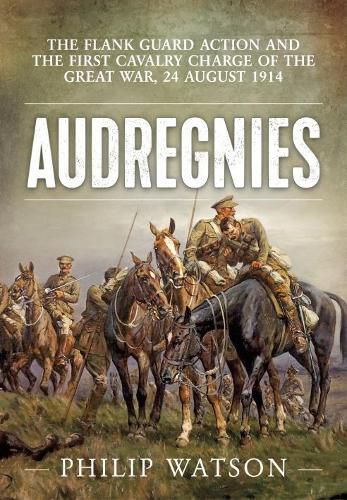Audregnies: The Flank Guard Action and the First Cavalry Charge of the Great War, 24 August 1914
Major (Retd) Philip Watson

Audregnies: The Flank Guard Action and the First Cavalry Charge of the Great War, 24 August 1914
Major (Retd) Philip Watson
The book takes the statement of LSgt Taylor of the 9th Lancers Germany? I thought we were off for another go at the French and aims to explain how in a period of 99 years the military alliances between Britain and France and Germany had become reversed. The narrative has parallel stories of social and military reform interwoven with the dynastic changes and family politics within the European monarchy, which created the situation by which the tinder box could ignite much of what was fuelled by the press of the day. It endeavours to explain the prevailing focus of the liberal government both at home and in its imperial interests, which lead to the situation by which there was no clear policy or alliances which would necessitate it supporting France if it were invaded by Germany. The author has mixed the minutiae of the thoughts and details of those who played key roles and introduces them before they became significant players in the subsequent war that was to follow. The book benefits from a series of high quality maps which help to explain the complexity of the action at Audregnies and Elouges, and is profusely illustrated with pictures of those who were there, which brings the story to life and humanises an action which has become known as a faceless casualty list for its perceived success or failure. The author has drawn together many un-published diary accounts from the regiment’s involved in an attempt to show the interactions between the units concerned, and avoids telling the story from just a single-unit perspective. For the first time the author has integrated the German story from German regimental histories and diaries to give the story a holistic picture, which sees the German Imperial Army put into practice, with success, their pre-war training and doctrine. The analysis and critique is solely based around the actions of the units involved and has avoided some of the much repeated ‘sound bites’ which are not relevant to this story. The analysis is based around the instructions given to Field Marshal French by Lord Kitchener before he left, and how the commanders implemented the tactics which had been articulated in their own specific to arms publications and the Field Service Manual 1909. 50 b/w photographs, illustrations, maps
This item is not currently in-stock. It can be ordered online and is expected to ship in approx 2 weeks
Our stock data is updated periodically, and availability may change throughout the day for in-demand items. Please call the relevant shop for the most current stock information. Prices are subject to change without notice.
Sign in or become a Readings Member to add this title to a wishlist.


